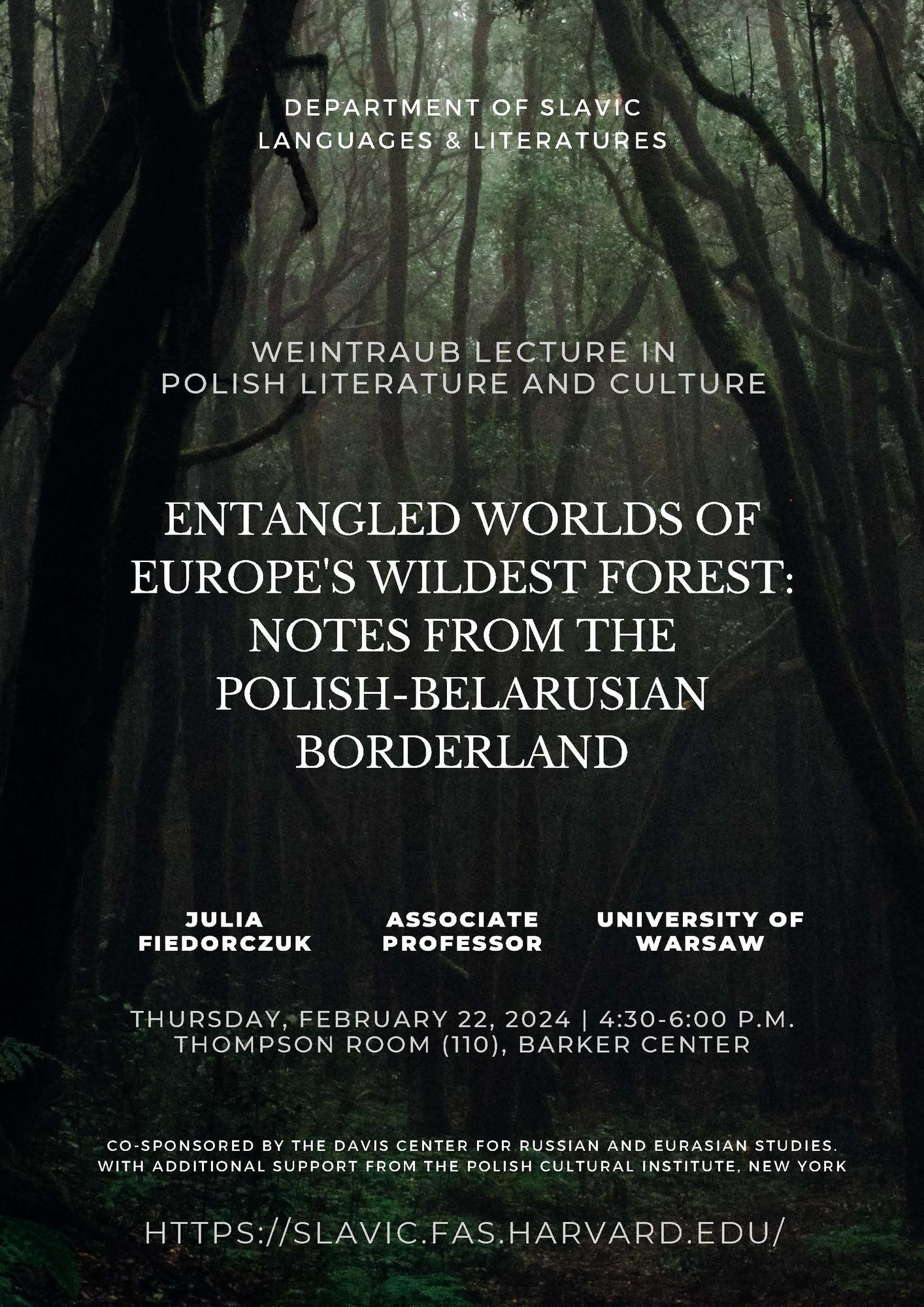Date:
Location:

Weintraub Lecture in Polish Literature and Culture
Julia Fiedorczuk, Associate Professor, University of Warsaw
Moderator: Aleksandra Kremer, John L. Loeb Associate Professor of the Humanities, Department of Slavic Languages and Literatures
Puszcza Białowieska, an ancient forest on the Polish-Belarusian border, is a unique reservoir of biodiversity, a UNESCO world heritage site, an inspiration to poets and artists, and - since August 2021, when a new immigration route into Europe was artificially opened by the Belarusian dictatorship - witness to a dramatic humanitarian crisis. This remote, easternmost corner of Europe, appreciated by nature-lovers, researchers and exhausted Varsovians seeking respite from the stresses of city life, has become a complicated space where entangled planetary problems manifest themselves in new ways. To consider these problems together, including such fundamental issues as climate change, migrations, the omnipresence of technology, the loss of biodiversity, is an intellectually challenging task whose urgency reaches far beyond this one specific geographical location. To write these problems is a literary challenge affecting not only the themes of literature but also its aesthetic strategies. The search for new forms of engaging with the crises-stricken world is especially intense in new, investigative poetries, though what is loosely termed as ecopoetics can be also encountered in fiction as well as non-fiction and essay. This talk will start in Białowieża (the setting of recent writings), and will subsequently look at selected Polish ecopoetic texts of different genres in order to reflect on the challenges and possibilities of literary imagination attempting to cross or problematize various borders, those cutting across geographical locations as well as those we carry in our bodies, minds and stories.
Julia Fiedorczuk is a writer, poet, translator, and researcher. As an academic, she is an associate professor at the Institute of English Studies and a co-founder of the Environmental Studies Center at the University of Warsaw. Her academic publications include: Cyborg w ogrodzie: wprowadzenie do ekokrytyki (The Cyborg in The Garden: An Introduction to Ecocriticism) and, in collaboration with Gerardo Beltrán, Ecopoetics: An Ecological Defence of Poetry. As a poet and writer, she has published short stories, essays, and novels - including Pod Słońcem (Under the Sun, 2020) and Dom Oriona (The House of Orion, 2023) – as well as six poetry books. Her latest volume, Psalmy (Psalms, 2017), was awarded the Wisława Szymborska Prize in 2018. Her work has been translated into more than 20 languages.
Co-sponsored by the Davis Center for Russian and Eurasian Studies. With additional support from the Polish Cultural Institute, New York.
Harvard University welcomes individuals with disabilities to participate in its programs and activities. If you would like to request accommodations or have questions about the physical access provided, please contact the Slavic Department at 617-495-4065 or slavic@fas.harvard.edu in advance of your participation or visit. Requests for Sign Language interpreters and/or CART providers should be made at least two weeks in advance, if possible. Please note that the university will make every effort to secure services, but that services are subject to availability.
| 2024_2_22_slavic_weintraub_entangledworlds.pdf | 5.14 MB |